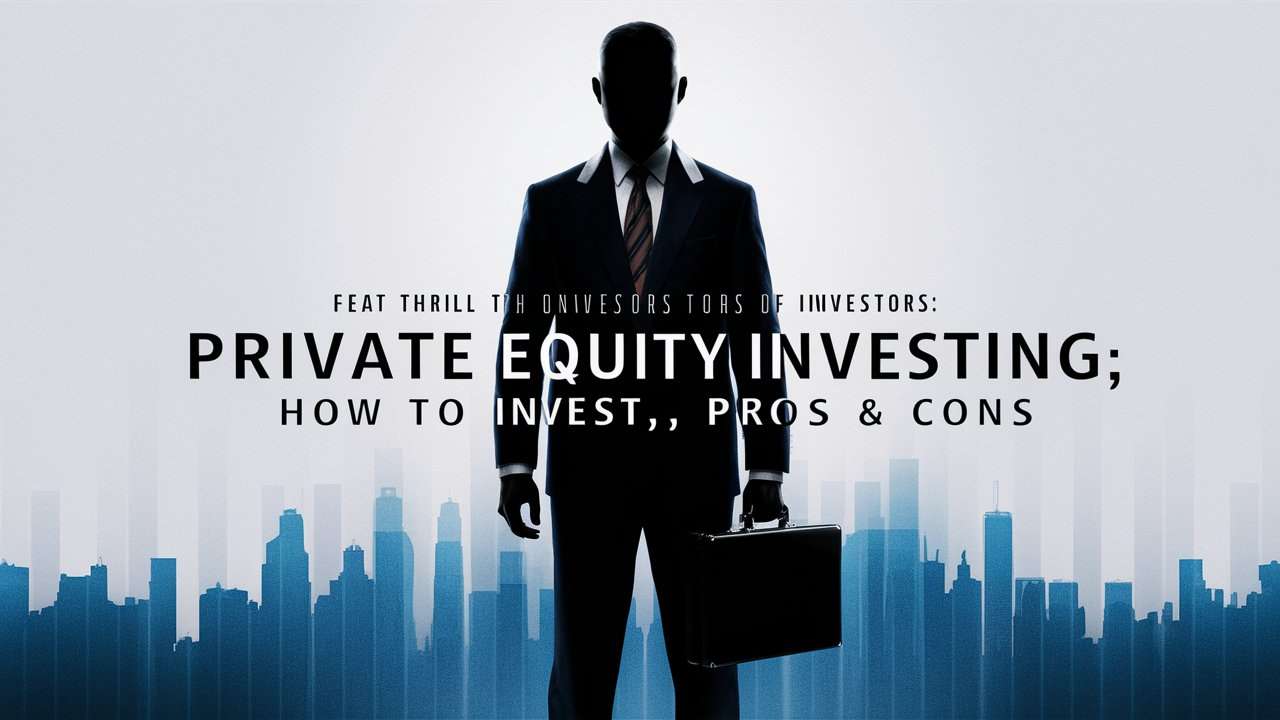Introduction
Welcome to the World of Private Equity Investing
Welcome to the exhilarating, high-stakes universe of private equity investing! If traditional investments like stocks and bonds feel a bit too tame for you, private equity might be the wild roller coaster ride you’re craving. Here, fortunes are made and lost behind closed doors, away from the prying eyes of public markets. Buckle up as we dive into the nitty-gritty of investing in this exclusive arena!

Why Private Equity Might Be the Wild Ride You’re Looking For
Ever dreamed of rubbing elbows with industry titans and taking a stake in the next unicorn company? Private equity offers just that, with the added spice of high risk and high reward. It’s not for the faint of heart or those with a low tolerance for financial suspense. But if you’re ready to play in the big leagues, this could be your ticket to the kind of investment thrill ride you’ve been waiting for.
What is Private Equity Investing?
Private Equity 101: The Basics You Need to Know
Private equity investing involves putting your money into privately-held companies, which aren’t listed on public stock exchanges. This means you’re buying into businesses that are looking to grow, transform, or maybe even become the next big thing. In return, you’re hoping for substantial returns when these companies either go public or get acquired.
The Secret Sauce: How Private Equity Differs from Public Investing
Unlike public investing, where you buy shares of companies that are traded on the stock market, private equity deals with companies that are privately owned. This means fewer regulations, more direct involvement, and often a longer wait for your money to make its grand return. Think of it as a behind-the-scenes pass to the investment show, where the stakes are higher and the returns can be jaw-dropping.

How to Get Started with Private Equity Investing
Finding Your Way In: Steps to Begin Your Private Equity Journey
Ready to dip your toes into private equity? Start by doing your homework🤑research different private equity firms, understand the types of investments they make, and get a grip on the required capital. Many investors begin by joining private equity funds or partnerships that pool resources to invest in various opportunities. And, of course, don’t forget to assess your own financial goals and risk tolerance.
The Allure of Limited Partnerships: What’s in It for You?
Limited partnerships are the most common structure in private equity. As a limited partner, you provide capital and share in the profits, but you don’t get involved in the day-to-day management of the investments. This arrangement allows you to benefit from the expertise of general partners who handle the heavy lifting while you enjoy the ride.
Choosing the Right Private Equity Fund: Tips and Tricks
Picking the right private equity fund is like choosing a high-stakes poker game🤑do your due diligence. Look for funds with a solid track record, experienced management teams, and a strategy that aligns with your investment goals. Consider factors like the fund’s investment focus, historical performance, and fees. And remember, the devil is in the details, so scrutinize every aspect before committing.

Types of Private Equity Investments
Venture Capital: Betting on the Next Big Thing
Venture capital is all about spotting startups with the potential to revolutionize industries. Investing in these high-growth companies can be thrilling, but also highly risky. You’re betting on early-stage businesses to hit it big, often with the hope that they’ll grow rapidly and eventually go public or get acquired.
Buyouts: The Art of Acquiring and Transforming Companies
Buyouts involve acquiring established companies and then working to improve their operations, profitability, or strategic direction. This type of private equity investment can be particularly rewarding if you have a knack for turning around struggling businesses or optimizing high-performing ones for even greater success.
Growth Capital: Fueling Expansion with Cash
Growth capital is used to help companies expand their operations, enter new markets, or develop new products. Unlike venture capital, which focuses on startups, growth capital is typically invested in companies that are already established but need additional funding to scale up. It’s a great option if you’re interested in supporting businesses poised for significant growth.
Mezzanine Financing: The Hybrid Investment Strategy
Mezzanine financing sits between equity and debt. It’s a form of capital that’s often used to fund the expansion of companies, providing a middle ground that offers higher returns than traditional debt but lower risk than pure equity. Mezzanine investors typically receive a mix of interest payments and equity stakes.

Pros of Private Equity Investing
High Return Potential: The Promise of Big Rewards
The allure of private equity lies in its potential for high returns. Investing in private companies, especially those poised for rapid growth or a successful exit, can lead to substantial financial gains. Of course, this comes with increased risk, but the potential rewards can be worth the gamble.
Access to Exclusive Deals: The Perks of the Private Club
Private equity investors often gain access to exclusive investment opportunities not available to the general public. This VIP access allows you to get in on deals with high potential, enjoy insider information, and collaborate with industry experts. It’s like having a backstage pass to the investment world’s hottest shows.
Hands-On Management: Influence the Direction of Your Investment
One of the perks of private equity investing is the ability to take an active role in managing your investments. Unlike public stocks, where you’re just another shareholder, private equity often involves working closely with the management teams of the companies you invest in. This hands-on involvement can be both rewarding and exhilarating.
Diversification: Adding a New Dimension to Your Portfolio
Private equity can add a unique dimension to your investment portfolio. By investing in privately-held companies, you’re diversifying beyond traditional stocks and bonds. This can help spread your risk and potentially enhance your overall returns, especially if private equity investments outperform public market investments.

Cons of Private Equity Investing
High Risk: The Gamble of the Investment World
With the potential for high returns comes high risk. Private equity investments can be volatile, and there’s always the chance that a promising company might not perform as expected. The higher risk factor means you need to be prepared for the possibility of losing your investment.
Long Investment Horizons: Patience is More Than a Virtue
Private equity investments often require a long-term commitment. It can take several years before you see a return on your investment, as private equity deals typically have longer timelines for growth and exit. Patience is key, and you need to be ready for a wait that could stretch over a decade.
Liquidity Issues: Your Money’s Stuck in a Financial Time Capsule
One of the major drawbacks of private equity is the lack of liquidity. Once your money is invested, it’s often locked in for a long period. Unlike publicly traded stocks, you can’t easily sell your stake if you need quick access to your funds.
High Fees: The Price of Exclusive Access
Private equity funds often come with high fees, including management fees and performance fees. These fees can eat into your returns, so it’s important to understand the cost structure before investing. Make sure the potential returns justify the expense.
Evaluating Private Equity Opportunities
Due Diligence: The Art of Investigating Your Investment
Before diving into a private equity investment, thorough due diligence is essential. Investigate the company’s financials, business model, market potential, and management team. A meticulous review will help you identify red flags and ensure that your investment is sound.
Understanding Valuation: How Much is That Startup Really Worth?
Valuing a private company can be tricky. Unlike publicly traded companies, private firms don’t have a market price to guide you. Understanding how to assess a company’s worth🤑based on its financials, growth prospects, and industry comparisons🤑is crucial for making informed investment decisions.
Management Teams: Spotting the Geniuses Behind the Scenes
The success of a private equity investment often hinges on the quality of the management team. Look for experienced, visionary leaders who have a track record of success. A strong management team can make the difference between a winning investment and a costly mistake.

Common Pitfalls and How to Avoid Them
The Overpromise Trap: Separating Hype from Reality
Be wary of investments that promise sky-high returns with little risk. The allure of private equity can sometimes lead to exaggerated claims. Always verify the facts and avoid falling for the hype.
The Illusion of Control: Knowing Your Limits
While private equity allows for hands-on involvement, it’s important to recognize your limits. You may not have full control over the company’s operations or strategic decisions. Understand your role and avoid overstepping, which can lead to conflicts and inefficiencies.
Timing the Market: When to Jump In and When to Stay Out
Timing can be crucial in private equity. Entering the market at the wrong time can affect your investment’s success. Keep an eye on market trends, economic conditions, and industry developments to make informed decisions about when to invest.

Real-Life Examples
Success Stories: When Private Equity Pays Off Big
There are plenty of stories where private equity investments have yielded spectacular returns. Think of companies like Facebook or Alibaba, which received early-stage funding and went on to achieve massive success. These success stories illustrate the potential of private equity to deliver outstanding results.
Cautionary Tales: When Private Equity Investments Go South
Not all private equity investments end in triumph. There are also cautionary tales of investments that didn’t pan out as planned. Companies that failed to grow or faced unforeseen challenges can serve as valuable lessons for future investments.
Private Equity vs. Other Investment Options
Private Equity vs. Stocks: The Battle of Returns and Risks
Private equity and stocks each have their own set of advantages and risks. While stocks offer liquidity and transparency, private equity provides potential for higher returns but comes with greater risk and longer investment horizons. Understanding these differences can help
you choose the best investment strategy for your goals.
Private Equity vs. Real Estate: Comparing Risk and Reward
Both private equity and real estate investing offer unique opportunities for growth. Private equity involves investing in businesses, while real estate focuses on property. Compare the risk profiles, potential returns, and investment timeframes to determine which suits your preferences.
Private Equity vs. Mutual Funds: A Clash of Investment Philosophies
Mutual funds offer diversification and professional management, while private equity provides a more hands-on approach with higher risk and reward. Explore the contrasts between these investment options to find out which aligns better with your investment strategy.
Tips for Successful Private Equity Investing
Networking: Building Relationships in the Private Equity Sphere
Networking is crucial in private equity. Building relationships with industry insiders, fund managers, and fellow investors can open doors to valuable opportunities and provide insights that can enhance your investment decisions.
Staying Informed: Keeping Up with Trends and Market Changes
The private equity landscape is dynamic, with trends and market conditions constantly evolving. Stay informed about industry news, emerging sectors, and economic shifts to make well-timed investment decisions and stay ahead of the curve.
Leveraging Expert Advice: When to Seek Professional Guidance
Navigating the world of private equity can be complex. Don’t hesitate to seek advice from financial advisors or industry experts. Their guidance can help you make informed choices, avoid common pitfalls, and maximize your investment potential.
Conclusion
The Verdict: Is Private Equity Investing Right for You?
Private equity investing offers exciting opportunities but comes with its own set of challenges. Consider your risk tolerance, investment horizon, and financial goals when deciding if it’s the right fit for you. If you’re up for the challenge and have the patience, private equity might just be the high-stakes adventure you’re looking for.
Making Your Move: Next Steps for Aspiring Private Equity Investors
Ready to take the plunge? Start by researching private equity funds, assessing your own financial situation, and connecting with industry professionals. With careful planning and a solid strategy, you’ll be on your way to navigating the thrilling world of private equity investing.
People Also Ask
Are private equity funds a good investment?
Private equity funds can be a good investment if you’re looking for high returns and can handle substantial risk. They offer the potential for significant gains, especially if you invest in successful startups or turnaround situations. However, they also come with high fees, long investment horizons, and a higher risk of failure compared to more traditional investments.
How much money do you need to invest in private equity?
Investing in private equity usually requires a substantial initial commitment. Most private equity funds have minimum investment thresholds ranging from $100,000 to several million dollars. This high barrier to entry is partly due to the exclusive nature of these investments and the need to pool significant capital for substantial deals.
What is a private equity example?
A classic example of private equity is the investment made in Facebook before it went public. Early investors, such as venture capital firms and private equity funds, provided capital to Facebook when it was a startup, helping it grow rapidly. When Facebook went public, these early investors reaped substantial rewards from their initial investments.
How does PE work?
Private equity (PE) works by pooling funds from investors to acquire stakes in privately held companies. The goal is to improve the company’s performance and value through strategic management, operational improvements, and financial restructuring. After a period of growth and development, the PE firm aims to exit the investment through a sale, public offering, or other means, ideally at a substantial profit.
Is private equity investing risky?
Yes, private equity investing is considered risky. Investments in private equity often involve high stakes with long investment horizons and limited liquidity. The success of your investment relies on the performance of the companies in which the private equity fund invests, and there is a risk of significant losses if these companies underperform or fail.
Who funds private equity?
Private equity is funded by a mix of institutional investors (such as pension funds, endowments, and insurance companies), high-net-worth individuals, and family offices. These investors provide the capital that private equity firms use to acquire and manage investments in private companies.
How to become a private equity investor?
Becoming a private equity investor typically involves either investing directly in private equity funds or becoming a professional in the field. For individuals, this often means meeting high net worth or accredited investor requirements and working with private equity firms to make investments. For professionals, it involves acquiring expertise in finance, investment analysis, and deal-making, often starting with a background in investment banking or management consulting.
Does private equity make money?
Yes, private equity can make money, and it often generates substantial returns for investors. The profitability comes from acquiring companies at a favorable valuation, enhancing their performance, and then selling them at a higher value. However, the success of private equity investments depends on the skill of the managers and the performance of the invested companies.
How does private investing work?
Private investing involves putting money into companies that are not publicly traded. Investors provide capital in exchange for equity or debt in these private companies. The aim is to benefit from the company’s growth and eventual exit, either through a sale or an initial public offering (IPO). Unlike public investments, private investing requires thorough due diligence and often involves a longer time horizon.
Why is private equity so popular?
Private equity is popular due to its potential for high returns, access to exclusive investment opportunities, and the ability to influence company growth and strategy. Investors are attracted by the possibility of significant profits and the chance to be involved in transformative business ventures that are not available through public markets.
What are private equity jobs?
Private equity jobs include roles such as private equity analyst, associate, principal, and partner. These positions involve tasks like sourcing deals, performing due diligence, managing portfolio companies, and strategizing exits. Careers in private equity often require a background in finance, strong analytical skills, and experience in investment banking or consulting.
Can normal people invest in private equity?
While private equity investments are generally accessible to high-net-worth individuals and institutional investors, there are increasingly opportunities for regular investors through platforms that offer access to private equity investments with lower minimums. However, these opportunities are still limited compared to traditional investment avenues.
Is private equity easy?
Private equity is not easy. It involves complex financial analysis, significant risk management, and long-term commitment. Investing in private equity requires a deep understanding of market dynamics, company performance, and strategic management. It’s a demanding field that requires expertise and patience.
Is private equity better than stocks?
Whether private equity is better than stocks depends on your investment goals, risk tolerance, and time horizon. Private equity can offer higher returns and exclusive opportunities but comes with higher risk and less liquidity. Stocks provide liquidity, transparency, and lower barriers to entry but may not offer the same potential for outsized gains as private equity investments. The choice between the two depends on your individual investment strategy and objectives.









